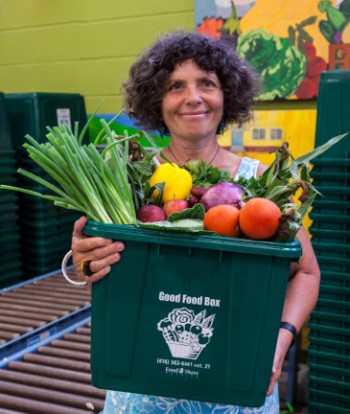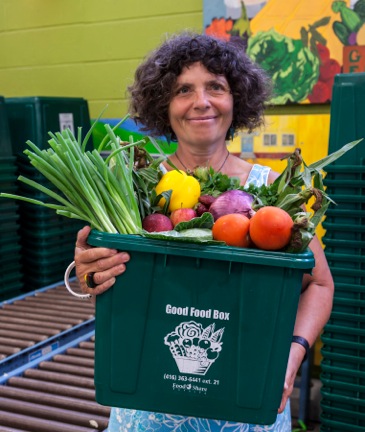Interview with Debbie Field, Executive Director, FoodShare Toronto

photo credit: Laura Berman, GreenFuse Photography
Debbie Field became Executive Director of FoodShare in 1992, and has helped build FoodShare into Canada’s largest food security organization. She believes passionately in the healing power of food, and the ability of food to strengthen communities and bring people together.
What motivated you to get involved with food policy and to become a food policy advocate? Was there a specific trigger or inciting incident?
I got involved when my son Joe, who is now 30, was six. There is no national food school program in Canada. When Joe moved from daycare to grade one. I asked him what he wanted for lunch and he said, “a salami sandwich, a bag of potato chips and a pop.” I knew we could do better and I helped organize one of Toronto’s first healthy hot lunch programs which is still operating today.
Can you describe FoodShare?
FoodShare Toronto operate a series of innovative community based non-profit social enterprise projects and community and school programs that facilitate empowerment and community development from the ground up, cultivating awareness, building citizenship and enhancing individual and community participation, all while striving to improve access to good healthy food. We also advocate for the public policy changes needed to put food first and ensure that everyone has adequate access to healthy, affordable, sustainably produce food.
I’ve read that you believe in the healing power of food — can you explain and share your insight?
We live in very difficult times in which the social safety net is frayed, and people are feeling very demoralized about their economic and political futures. This is a global dynamic in which high unemployment is the norm, and basic rights are constantly being eroded. Without sounding naïve, prioritizing food in one’s own life and in government social policy can provide hope in creating healthier individuals and communities.
What do you believe to be the greatest food policy challenges for Toronto? And from what you know about NYC, how would you compare it to Toronto’s food challenges?
The last decade has seen a dramatic increase in interest in local and healthy food with farmers markets and restaurants that promote local and healthy expanding. And yet there remains great inequality between those who are participating in this food revolution, and most of the population who still struggle to put any food on their table. In Toronto and in NYC too, the food revolution needs to expand its vision and tactics so that low income and communities of color can participate.
Would strengthening the public food sector have health, economic and community development benefits throughout New York City? What can New York City learn from Toronto and other cities around the world? (Watch Debbie’s presentation and the resulting discussion at our spring 2014 Food Policy for Breakfast Seminar on the Public Food Sector)
If we are going to make sure that everyone has increased access to healthy food, we need to subsidize basic foods though a public food system. Just as NYC has built a great public transportation system that ensures that people of all incomes use the subway and get around the City, so do we need to create a public system that would increase access to healthy, locally grown food and make food a basic human right for everyone.
How does your organization think about the connections between hunger, food insecurity and obesity? What strategies do you suggest for better integrating the efforts to reduce these two food-related problems?
We live in times in which over 1.1 billion people will go to sleep hungry tonight and over 1.1 billion will go to sleep malnourished from over nutrition or too much unhealthy food. These two dynamics seem to FoodShare to be interconnected. The solution again is to say that some foods, perhaps vegetables, fruits, grains and beans would be subsidized so that all people of all incomes could have better access to these core foods, the basic building blocks of health. And FoodShare adds a third crisis to the twin problems of hunger and food related illness — the crisis of unsustainable agriculture, so would like to see that the basic healthy foods that would be subsidized would be purchased from small family farmers in the local bio-region to help ensure the sustainability of that sector.
Learn more about the Public Food Sector
Fact Sheet
What’s the last Food Policy book or blog you read: Oxfam Article on Brazilian Zero Fome Movement (zero hunger)
Current Location: Toronto Ontario
Education: BA in Sociology and English Literature, MA in Adult Education,
Favorite Food: Greek Salad with lots of feta cheese and olives
Website: www.foodshare.net


